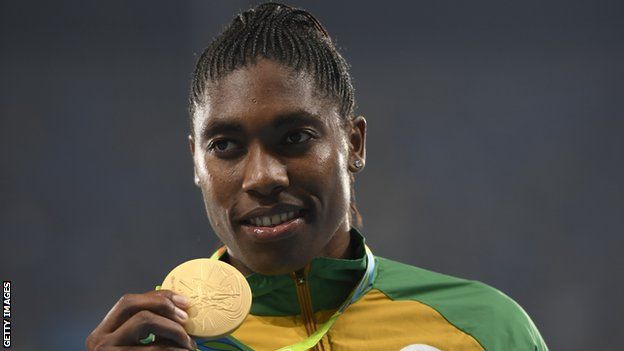Caster Semenya: South African government calls on world to fight against IAAF rule
- Published

Caster Semenya won the 800m title at the 2012 and 2016 Olympic Games
Caster Semenya has been "targeted", says South Africa's sports minister, who called a proposed IAAF rule a human rights violation.
Olympic 800m champion Semenya, 28, is challenging athletics' governing body over its bid to restrict the levels of testosterone in female runners.
The case will begin on Monday at the Court of Arbitration for Sport (Cas).
"The world once declared apartheid a crime against human rights," Thokozile Xasa said.
"We once more call the world to stand with us as we fight what we believe is a gross violation of human rights."
Apartheid was a system of racial segregation imposed by a minority white ruling group in South Africa from 1948 to 1991.
Xasa said on Friday that "far more was at stake" than the right to participate in sport.
"Women's bodies, their very identity, their privacy and sense of safety and belonging in the world, are being questioned," she said.
"Our history as a nation was in the main based on the defence of our people against their human rights violation - that all humans are created equal.
"This is a gross violation of internationally accepted standards of human rights law."
Athletics South Africa also gave world champion Semenya its "unqualified support".
What does the rule mean?
The proposed IAAF rule would apply to women who race in track events from 400m up to the mile.
Under the ruling, female athletes with naturally high testosterone levels would have to race against men or change events unless they took medication to reduce it.
Athletes who wanted to compete in those events must take medication for six months, then maintain a lower testosterone level.
The rules were intended to be brought in on 1 November last year, but were delayed until 26 March after the legal challenge from Semenya and ASA.
The IAAF denied a report on Thursday that lawyers would argue athletes like Semenya should be classified as male.
Speaking in June, Semenya called the ruling "unfair", adding: "I just want to run naturally, the way I was born."
As an 18-year-old, she was asked to take a gender test but no results have officially been made public.
The case will be heard from 18-22 February, with an outcome expected by 29 March.